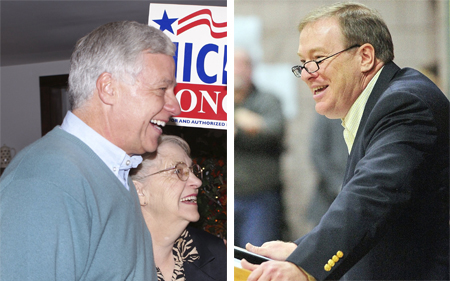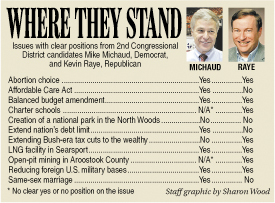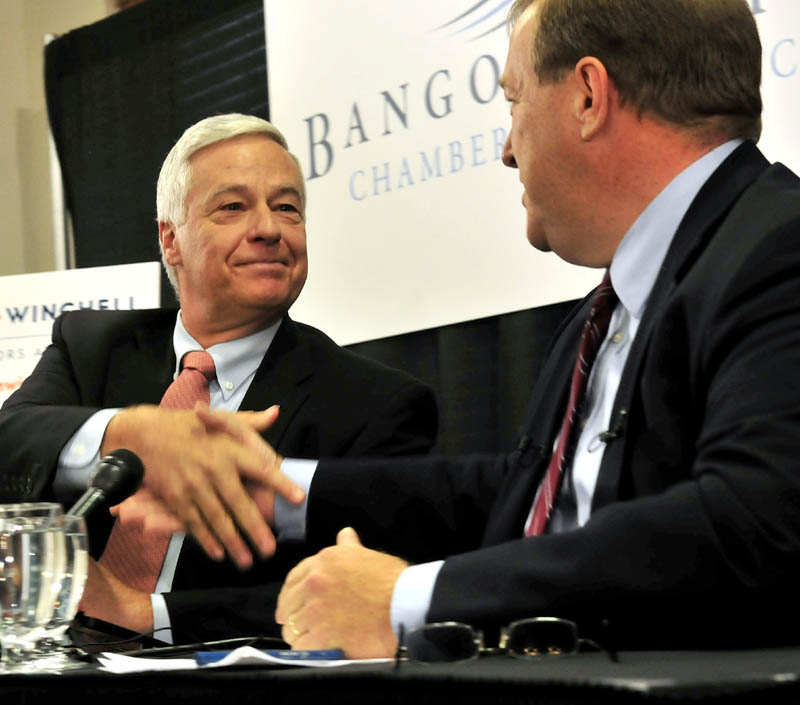After four debates and two months of heavy campaigning, the candidates in Maine’s 2nd Congressional District have crafted clear and distinguishing images.
Democratic incumbent Mike Michaud has positioned himself as a defender of U.S. manufacturing and a staunch advocate for veterans. Republican challenger and state Senate President Kevin Raye has touted himself as the business-friendly candidate with the energy and political chops to untangle partisan gridlock in Washington.
Even as those contrasts have emerged, the candidates agree on a surprising number of issues: both support abortion choice, a balanced budget amendment, a reduction of U.S. military bases on foreign soil and the creation of a liquid natural gas storage area in Searsport. Both also oppose a proposal by landowner Roxanne Quimby to create a national park in the Maine North Woods.
Debates between the two have focused on a mix of questions from hosts and television viewers on broad topics. Most often, candidates have been asked to share their thoughts on issues that may or may not be addressed during the next two years by the 113th Congress.
Less often, they are asked what they’ve done lately.
Both Raye and Michaud also point to legislation tied to one another, saying those issues deserve more scrutiny by voters still weighing their options in these final days before Election Day.
Greater differences between the two candidates emerge based on an examination of key pieces of legislation that they have sponsored or introduced during the past two years.
Working across the aisle
National approval of Congress hit historic lows earlier this year. Although approval has ticked up recently, national leaders are still in the doghouse: a scant 21 percent of Americans approved of their work, according to a Gallup poll, and many believe partisanship is to blame.
Jim Melcher, a political science professor at University of Maine at Farmington, said public sentiment about Congress has influenced the 2nd District race and many others.
“There is a strong sense among much of the public that, ‘We want you to stop arguing and get things done,'” Melcher said.
Both Michaud and Raye have pitched themselves as an antidote to partisanship — a dominant theme that emerged in their first debate. Michaud often cites bills he has sponsored alongside Republicans, while Raye says his colleagues voted him “most likely to influence the other side of the aisle,” in June 2011 during the state Senate’s version of senior superlatives.
That same month, Raye — as the recently appointed state Senate president — helped deliver on a statewide Republican campaign promise to make Maine more business-friendly. Raye sponsored L.D. 1 — a package of reforms that passed unanimously in the state Senate, with just three dissenting votes in the House. The law provides more support for small businesses as they navigate state regulations, loosens environmental rules, and offers incentives for companies to self-report environmental violations.
Campaign manager Rob Caverly said Raye’s support and the passage of the reforms points to two strengths embodied by the candidate. First, it demonstrates Raye’s willingness to stand behind small business and second, it points to Raye’s ability to work across party lines.
The odds were stacked against the bill, particularly after a few high-profile gaffes by then-new Gov. Paul LePage — who initially championed the effort — and a rancorous atmosphere in Augusta.
“What started out as a partisan, no-way-this-is-going-to-happen bill ended up with a 35-to-nothing vote,” Caverly said.
Similarly, in June 2011, the Legislature passed L.D. 1043 — the biennial state budget — by an overwhelming majority, 29-5, in the Senate. The budget included $9 million in cuts.
“It was also said there was no way this budget was going to get voted through,” Caverly said.
Melcher said Raye’s campaign message is a common theme among many Republicans in this election cycle — their tone has shifted away from a “more confrontational, tea party-backed approach in 2010,” he said.
Michaud’s record also demonstrates a willingness to cross the aisle. He is a member of the Blue Dog Coalition — a 25-member group of moderate Democrats in the House. Michaud has also earned the rare distinction of winning an endorsement from the National Rifle Association — a group known for its overwhelming support of Republicans over gun rights issues.
In September, Michaud joined with seven fellow Democrats and 13 Republicans to co-sponsor H.R. 6439 — the Keep the Forest in the Family Estate Tax Act of 2012. The bill hasn’t been voted on, but the goal is to exempt standing timber from being assessed for additional estate taxes.
“If Maine families are forced to sell their forest land or harvest timber prematurely just to pay the estate tax, Maine risks losing family-owned forests,” said Michaud’s campaign spokesman, Dan Cashman. “Congressman Michaud strongly felt that such a situation should be corrected.”
Estate taxes, or so-called death taxes, have been a national Republican rallying point since 2000, when George W. Bush made it a campaign issue.
Melcher said Michaud has often demonstrated a willingness to go against party leadership, on trade issues in particular, but his support for landowners with forestry interests isn’t necessarily a surprising move.
“This strikes me as the sort of thing a congressperson from the 2nd District — with all the forest land it has — would be likely to back regardless of their party,” Melcher said. “Members have a pretty high degree of freedom to vary from their leadership on the local issues most important to their constituencies.”
Friends to manufacturing
Michaud has made U.S. manufacturing a cornerstone of his campaign, while Raye has distinguished himself as the voice for small businesses. However, both candidates are proven supporters of Maine manufacturers.
In September, Michaud helped orchestrate a media frenzy in Norridgewock, when he and U.S. Trade Representative Ron Kirk toured a New Balance shoe factory. Michaud has been an outspoken supporter of maintaining tariffs on imported sneakers, which could help preserve about 900 manufacturing jobs in Maine.
That same month, Michaud introduced the American Shoes for American Servicemembers Act to Congress, H.R. 2955. No votes have been taken yet, but the goal is to “clarify the requirement of the Department of Defense to procure footwear from American sources,” the bill states.
Michaud also spurred an investigation into potentially unfair trade practices in Canada’s paper industry that could impact Maine’s mills.
Likewise, Raye has demonstrated support for Maine manufacturers.
In May 2011, Raye sponsored legislation that cleared the way for a Baileyville pulp and paper mill to save about $1 million a month in energy costs. The passage of L.D. 1545 granted the Maine Public Utilities Commission oversight of private natural gas pipelines, instead of the federal government. The move allowed Woodland Pulp and Paper — a major employer in Washington County — to gain access to natural gas about a year earlier than under the federal system.
The conversion from heating oil to natural gas is expected to secure 310 paper-making jobs and 1,800 related jobs, including in logging and shipping.
Raye also worked a provision into Maine’s biennial budget called the New Markets Tax Credit Program. Caverly said the tax program allows investors to receive state tax credits for providing growth capital to Maine businesses.
The program was fine-tuned by Raye and others earlier this year in an effort to help investors create a plant in Millinocket to manufacture torrefied wood intended to replace coal at electricity plants. A similar program at the federal level provides tax breaks to investors, but the additional state-level breaks create a more attractive playing field in Maine than other states that do not offer the same benefit, Caverly said.
Health care
Across the country, the Affordable Care Act has become a near-obligatory campaign issue for candidates in this cycle. Although the popular national sentiment calls for bipartisanship, voters are still divided on so-called Obamacare — a fact that is not lost on Michaud and Raye.
Melcher said the health care debate presents the starkest contrast between Michaud and Raye, and it’s a ripe opportunity to appeal to their bases. But it might not have an impact on undecided voters.
Throughout the 112th Congress, Michaud voted against proposed repeals of the Affordable Care Act, but he acknowledges some its critics’ concerns, Cashman said.
“He thinks it’s a good start. It’s not perfect, but it’s a good starting point,” Cashman said.
Raye has said he would vote to repeal, but Cashman suggests the challenger is less than sincere.
“It’s interesting because when Kevin talks about repealing it, he wants to replace it with a number of things that are already in it. Repealing it outright will cost more than $100 billion. Repealing it would cost us all that money, and it would also put us back at square one. Where many have tried to get something started and failed, at least now we have a starting point, and we can work from that. The idea that Congressman Michaud has is to work together with members of both parties to try to come to consensus on what in the bill needs to be changed,” Cashman said.
Caverly said Michaud already had opportunities to revise the law.
“Congressman Michaud can say all he wants about needing to tweak Obamacare, but he’s already taken the test.” Caverly said.
Raye’s approach to reigning in health care costs is on display in L.D. 1333 — a contentious Republican-backed overhaul of the health insurance market in Maine. The law gives insurance companies more leeway in how much they can charge policyholders based on occupation and age, and it also allows insurance companies in four other New England states to sell insurance in Maine.
In the state Senate, 100 percent of Republicans supported the bill, while 78 percent of Democrats opposed it.
Although Raye is not listed as a sponsor, Michaud has repeatedly criticized his opponent for supporting the bill. Michaud has said the reforms have increased insurance costs to rural Mainers. Raye has said the new revisions to the law have reduced costs in rural Maine.
Tightening the belt
Caverly said he hopes voters will consider Michaud’s yes vote for the 2011-2012 Congressional budget.
“While millions of American’s are working with tighter and tighter budgets, Congressman Michaud voted against a modest decrease in his Congressional staff budget,” while Raye made significant cuts to the state Senate budget during the same period.
Cashman said Michaud didn’t vote against a general decrease; he voted against level funding for capitol police in the wake of the attack on Rep. Gabrielle Giffords in Arizona and the cuts to the government accountability office.
“When those were restored, and they found another way to cut their budget by 6.4 percent, he supported it,” Cashman said.
Caverly said Raye felt it was necessary to reduce his own staff budget by 22 percent, in step with economic times.
“People are outraged over public money being spent on expanding salaries when everyone else is taking a pay cut. When is government going to take a pay cut?” he said. “At least the Legislature in Maine understood that people were tightening their belts, and they were going to tighten theirs as well.”
Election laws
In 2011, Raye co-sponsored an effort to repeal Maine’s same-day voter registration law, called An Act To Preserve the Integrity of the Voter Registration and Election Process, L.D. 1376. The Republican-backed law was passed in June 2011, but it was overturned last November by a voter referendum.
The law would have prohibited absentee voting in the two business days before an election and banned voter registration on Election Day — an option that was on the books in Maine for nearly four decades.
Raye also co-sponsored a bill to require voters to present a photo ID before voting, called L.D. 199. The bill was passed, but only after it was stripped of its key provision and recast as a study into Maine’s election system.
“Maine has a proud history of having people vote in large numbers, and having access right up until election day,” Cashman said. “If you live in a town and you haven’t voted for 20 years, you might not be on the voting list any more, even if you think you are,” he said. “These laws that were sponsored by Kevin Raye would have limited accessibility for people to cast their ballot.”
Caverly agreed Mainers turn out at a much higher percentage than most states, but there is no direct correlation between same-day registration and high voter turnout, he said. He added that 42 states have a registration deadline.
Regardless, Raye has said it’s a moot issue, because voters repealed it through a referendum and he respects that result.
The east-west highway
In 2012, Raye co-sponsored and helped pass legislation that provides $300,000 in state money to do a feasibility study of a privately funded east-west highway across Maine. The bill, L.D. 1671, narrowly passed 19-15.
The project would rely on private, not government, funding for the construction and operation, and the finished 230-mile highway would be maintained with tolls.
The Michaud campaign questions Raye’s support of that bill. Lingering concerns over eminent domain — whether homes and property along the route can be taken away from their owners to make way for the highway — should have been addressed before funding a study, they say. If those issues aren’t worked out, the project might be a nonstarter even after spending $300,000, Cashman said.
Caverly countered that the east-west Highway holds great potential for economic growth to the region. Raye agrees that people’s concerns about eminent domain need to be addressed before any project begins, but “we ought to move forward with the study,” Caverly said.
“Furthermore, it’s a private project. From our understanding, they wouldn’t have the power of eminent domain. They’re a private business,” he said.
For example, Caverly pointed to Peter Vigue, who is CEO of Pittsfield-based Cianbro Corp. and a top proponent of the new highway.
“It’s not like Cianbro can walk in and say, ‘We’re taking the house, because we’re building this road.’ They can’t do that; it’s a private project.”
Red tape
Throughout the debates, Raye has tried to paint Michaud as a foe of small business issues. For instance, Michaud voted against repealing a provision within the Affordable Care Act that would have required businesses to fill out a 1099 tax form every time they made a payment of $600 or more to a vendor.
Michaud voted against the repeal and “against Maine’s small business community,” Caverly said.
Cashman said Michaud opposed the measure because the revenue lost by repealing the 1099 would have been offset by raising taxes on the middle class.
“He has supported other versions of the repeal. One would have used unspent federal stimulus money, which he felt was a much better funding mechanism,” Cashman said.
Cashman said Michaud’s approach to voting centers on the means to get to the goal. In this case, he was against it because it would negatively impact “middle class families in Maine.”
Caverly said that approach has led Michaud to vote against measures that he ultimately supports — the balanced budget amendment, for instance. He argues that politicians sometimes need to make a stand.
“How many times do we have to hear the same old story?” Caverly said. “Is that really the leadership that the people of Maine need? The people of Maine need their delegation to stand up for what’s right when the time comes.”
Veterans issues
Veterans in the 2nd District have gotten the royal treatment during the past decade from their congressman. Michaud has established himself as a friend to veterans. Melcher said Michaud’s approach is similar to other U.S. representatives.
“Michaud has done what House members normally do — work to be an expert on a particular subject, and in his case it’s veterans’ issues,” he said.
In 2011, for instance, Michaud introduced a bill that requires the U.S. Department of Veterans Affairs to fully reimburse state veterans’ homes for costs associated with care for severely disabled veterans. Cashman said the requirement will help state veterans’ homes remain solvent and ensure ongoing care.
Michaud has also helped open VA clinics in Auburn, Bangor, Houlton and Lincoln. In 2008, Michaud successfully fought to raise VA funding by $6.6 billion, an 18 percent increase over the previous year.
Raye has said veterans can expect the same attention to their concerns if he is elected.
During a recent debate, Raye recalled taking his father — a World War II veteran — to medical appointments at VA Maine Healthcare Systems-Togus hospital in Augusta and spending time with other veterans in waiting rooms. While working for Olympia Snowe, Raye was a caseworker who helped veterans navigate the VA system.
“We have a fundamental obligation to our veterans,” he said. “I have a very real appreciation for the importance of the VA and for the veterans health care system and the lives of our veterans.”
Raye sponsored a law that created a special driver’s license for veterans that allows them to easily demonstrate eligibility for veterans’ discounts. He also helped pass an income tax exemption for active duty military pay earned out of state. The exemption takes effect in 2014.
Ben McCanna — 861-9239
bmccanna@centralmaine.com
Send questions/comments to the editors.






Success. Please wait for the page to reload. If the page does not reload within 5 seconds, please refresh the page.
Enter your email and password to access comments.
Hi, to comment on stories you must . This profile is in addition to your subscription and website login.
Already have a commenting profile? .
Invalid username/password.
Please check your email to confirm and complete your registration.
Only subscribers are eligible to post comments. Please subscribe or login first for digital access. Here’s why.
Use the form below to reset your password. When you've submitted your account email, we will send an email with a reset code.